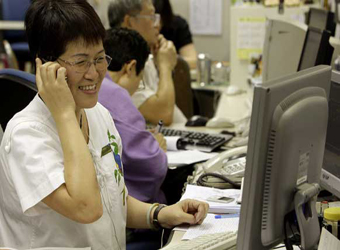Asian shares were higher on Monday, following the Dow Jones coming within inches of hitting the 20,000 mark during last Friday’s session.
The ASX 200 climbed 0.9 percent or 51.82 points at 5,8074, seeing broad gains across all sub-indexes except for materials and gold.
Fortescue Metals was down 3.79 percent at A$5.84 per share while Rio Tinto was off 1.3 percent at A$59.35, after Australia’s Department of Industry, Innovation and Science forecasts iron ore prices at $51.60 a tonne this year and $46.70 in 2018, compared to current spot prices of around $80.
In South Korea, the Kospi wavered between negative and positive territories, and last traded up 0.17 percent.
Shares of Samsung Electronics were up 3.48 percent to 1,873,000 won ($1551.70) each, after the company said last Friday that its fourth-quarter profit likely jumped 50 percent year-on-year, beating estimates on strong chip sales and rebound in smartphone sales. The positive outlook comes despite a slight fall in revenue and negative impacts from the cancellation of the fire-prone Galaxy Note 6.
“We believe Samsung Electronics’ earnings power should substantially improve in terms of stability and visibility, thanks to diversified earnings stream and much differentiated competitiveness especially in NAND and OLED,” said CIMB in a note released last Friday. NAND is a type of flash technology used in memory cards, while OLED is an organic compound used for electronic screen displays.
Across the Korean peninsula, North Korea had announced Sunday that it could test the launch of its intercontinental ballistic missile at any time from any location, Reuters reported.
In response, U.S. Defense Secretary Ash Carter said that North Korea’s arms development was a serious threat to the U.S., and that it was prepared to shoot down a North Korean missile launch or test.
China’s Shanghai composite gained 0.42 percent after initially trading flat while Shenzhen composite was up 0.163 percent. In Hong Kong, the Hang Seng index was up 0.2 percent.
Shares of ZTE were down 3.65 percent at 15.07 yuan per share, after the telecom equipment maker announced it would cut about 3,000 jobs, which is around 10 percent of total jobs.
Japanese bourses are closed for a holiday.
Last Friday on Wall Street, the Dow Jones industrial average reached a new all-time intraday high, coming within 0.37 points of hitting the elusive 20,000 mark, before closing up 0.32 percent at 19,963.8. The S&P 500 rose 0.35 percent at 2,276.9 while the Nasdaq composite closed up 0.6 percent at 5,521.06, both closing at record highs.
The dollar index, which measures the greenback against a basket of six major currencies, last traded at 102.37. It had traded at a range of 101.3 to 103.82 last week.
Against the dollar, the yen fetched 117.46 while the Australian dollar stood at $0.7307 compared to levels as low as 0.718 last week.
The Chinese yuan was trading at 6.9333 against the greenback, after the yuan mid-point was set at 6.9262 compared to its last close at 6.933.
Last Saturday, China released its currency reserves for December, which fell by $41.1 billion to $3,010.5 billion. It was the six consecutive monthly decline.
“The reserve drawdown largely reflects capital outflow and the People’s Bank of China’s intervention in the foreign exchange markets. In December the spot dollar/yuan depreciated by 0.9 percent, although the CFETS currency remained roughly stable,” said economists at Citi, in a note on Monday.
Brent futures slipped during Asian hours, down 0.18 percent at $57.00 a barrel, while U.S. crude futures dipped 0.35 percent at $53.81.
Source: CNBC


